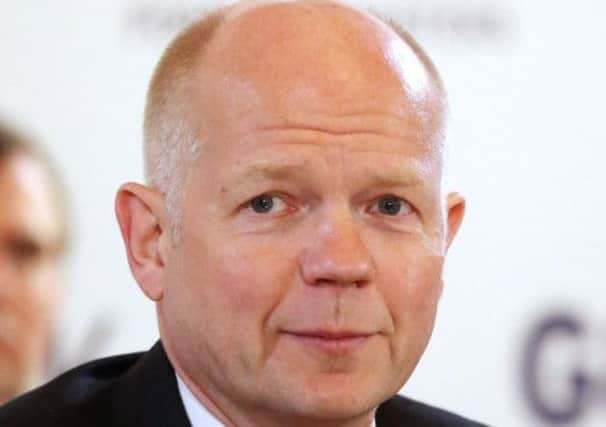Hague urged to address MPs over GCHQ data concerns


Douglas Alexander, the shadow foreign secretary, said Hague should make an “urgent statement” in the House of Commons tomorrow on the controversy.
Alexander said the Foreign Secretary should address public concerns arising from reports that GCHQ had gathered intelligence via the internet through a covertly run operation set up by America’s spy agency. It has been claimed that GCHQ was supplied with information gleaned from a highly classified US-run programme called Prism, which was run by America’s National Security Agency (NSA).
Advertisement
Hide AdAdvertisement
Hide AdDocuments have emerged showing Britain’s secret listening post has had access to the Prism system since at least June 2010. The Prism programme appeared to allow GCHQ to circumvent the formal legal process required to obtain personal material, such as e-mails, photographs and videos from internet companies based outside the UK.
US spies have been accused of tapping into servers of nine US internet giants including Apple, Facebook, Microsoft and Google in a pervasive anti-terror sweep. All companies deny giving government agents access to their servers.
GCHQ is to answer the claims before MPs on parliament’s Intelligence and Security Committee (ISC) within days.
Yesterday, Alexander said: “Our intelligence agencies do vital work to keep our country safe from harm, but it is also vital that they operate within a framework of legality and accountability. These reports have raised serious public concern, so I am now calling on the Foreign Secretary, William Hague, to come to the Commons on Monday to make an urgent statement to MPs.
“He must explain the government’s position and tell MPs how the government will work with the Intelligence and Security Committee to address these public concerns.”
Shadow home secretary Yvette Cooper added: “The intelligence agencies need to be able to get information from abroad, especially in their vital work against terrorist threats, but it must be within the legal framework agreed by parliament.
“The Prime Minister and other ministers should support the ISC in investigating these media reports and reporting on the UK’s involvement with the Prism programme.
“The government also needs to set out clearly what legal framework governs the UK relationship with the Prism programme, what role ministers play, what the safeguards and scrutiny are. They need to explain how this relates to long-standing legal requirements for warrants and inspection by the Intercept Commissioner.
Advertisement
Hide AdAdvertisement
Hide Ad“And the Home Secretary needs to provide full information to the ISC on Home Office use of the Prism programme, what procedures have been followed, including ministerial warrants and the nature of the intelligence gathered.”
The Scottish Government declined to comment on whether it had received intelligence information as a result of the project but Angus Robertson, the SNP’s Westminster leader, said: “The claims GCHQ was involved in secret intelligence gathering is something that needs to be responded to promptly by William Hague. Access to information should always be within the rule of law and subject to democratic scrutiny.”
Lewis MacDonald, Labour’s justice spokesman at Holyrood, said: “These revelations raise some serious concerns and it is important these are explored through the appropriate channels. There is an issue about invasion of privacy.”
A spokesman for GCHQ said: “Our work is carried out in accordance with a strict legal and policy framework which ensures that our activities are authorised, necessary and proportionate, and that there is rigorous oversight, including from the secretary of state, the Interception and Intelligence Services Commissioners and the Intelligence and Security Committee.”